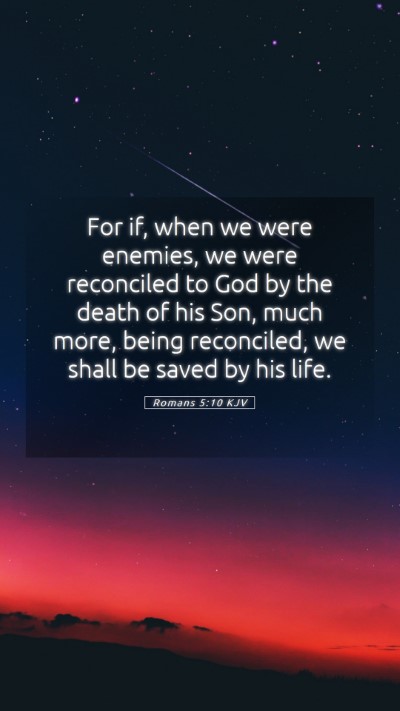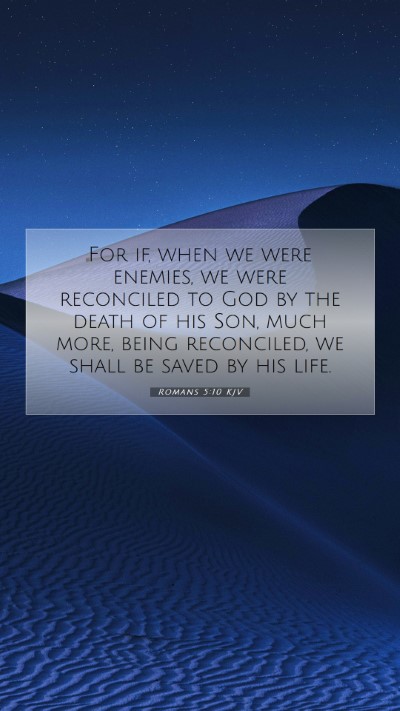Old Testament
Genesis Exodus Leviticus Numbers Deuteronomy Joshua Judges Ruth 1 Samuel 2 Samuel 1 Kings 2 Kings 1 Chronicles 2 Chronicles Ezra Nehemiah Esther Job Psalms Proverbs Ecclesiastes Song of Solomon Isaiah Jeremiah Lamentations Ezekiel Daniel Hosea Joel Amos Obadiah Jonah Micah Nahum Habakkuk Zephaniah Haggai Zechariah MalachiRomans 5:10 Meaning
What is the meaning of Romans 5:10?
For if, when we were enemies, we were reconciled to God by the death of his Son, much more, being reconciled, we shall be saved by his life.
Romans 5:10 Bible Verse Meaning
Understanding Romans 5:10
Romans 5:10 states:
"For if while we were enemies we were reconciled to God by the death of his Son, much more, being reconciled, we shall be saved by his life."
This verse encapsulates profound themes of salvation, reconciliation, and the transformative power of Christ’s resurrection. Below, we explore various perspectives on this verse through the commentary of esteemed biblical scholars like Matthew Henry, Albert Barnes, and Adam Clarke.
Verse Overview
In this passage, Paul emphasizes the prior state of believers as ‘enemies’ of God, illustrating the depth of human sin and separation from divine grace. He contrasts this former enmity with the reconciliation achieved through Christ's sacrifice.
Key Themes
- Reconciliation: The key message is that through Jesus' death, humanity can be reconciled with God. This reconciliation is pivotal to understanding biblical exegesis related to sin and grace.
- Salvation: The phrase “much more” denotes that those who have been reconciled through Christ's death will also experience salvation through His resurrection, implying a complete spiritual restoration.
- Human Condition: The passage underscores our previous state as enemies of God, enlightening us on our need for divine intervention and the gospel's redemptive power.
Commentary Insights
Matthew Henry's Commentary
Matthew Henry notes that this verse reveals the great love of God in offering His son for reconciliation while we were in rebellion against Him. Henry expounds that the grace of God is remarkably diligent in restoring us despite our unworthiness. The die was cast in Christ's death, marking the pivotal point of divine mercy, leading to an offer of salvation that is made accessible to all believers.
Albert Barnes' Commentary
Albert Barnes highlights the transition from hostility to peace through the death of Christ. He emphasizes that this reconciliation should instigate a sense of gratitude and assurance in believers. The implied certainty that believers will be saved through the life of Christ speaks volumes about the eternality of salvation and the confidence that follows faith in Him.
Adam Clarke's Commentary
Adam Clarke relates the verse to the notion of divine justice and mercy. He articulates that God’s action is congruent with His character; thus, having provided a means of reconciliatory salvation, it follows that those reconciled now dwell in the fullness of life offered through Christ. Clarke’s perspective accentuates the quantitative leap in assurance believers have regarding 'being saved' as it transcends mere physicality to encompass spiritual vitality.
Application in Daily Life
Understanding Romans 5:10 thoroughly enriches one's spiritual journey by providing clarity on the basis of salvation and assuring believers of their reconciled status with God. It reinforces the importance of Christ’s resurrection, not just as a historical event but as an ongoing source of life for believers.
Bible Study Insights
For those involved in bible study groups or seeking to engage in online Bible study, this verse can spark discussions on the themes of grace and reconciliation. Incorporating it into bible study lessons can deepen understanding of God's grace and encourage personal reflection on what it means to be reconciled with God.
Related Bible Verses
- Colossians 1:21-22: Discusses reconciliation through Christ's body.
- Ephesians 2:1-5: Highlights the transition from death to life through God's mercy.
- 2 Corinthians 5:18-19: States that God has given us the ministry of reconciliation.
- John 3:16: For God’s love in sending His Son for the salvation of humanity.
- Hebrews 7:25: Speaks to Jesus’ ability to save completely.
Conclusion
Romans 5:10 is a powerful declaration of God's redemptive plan through Christ. It invites believers to delve deeper into understanding scripture, particularly regarding concepts of reconciliation and salvation. This awareness provides assurance and hope, affirming that through faith in Jesus' death and resurrection, believers are not only reconciled but also saved to eternal life.


